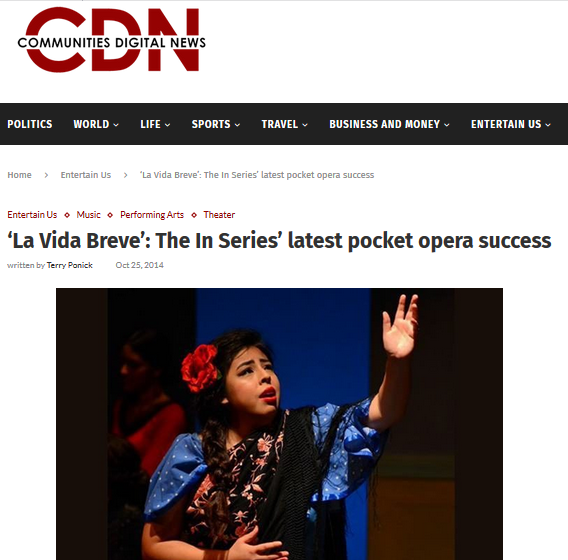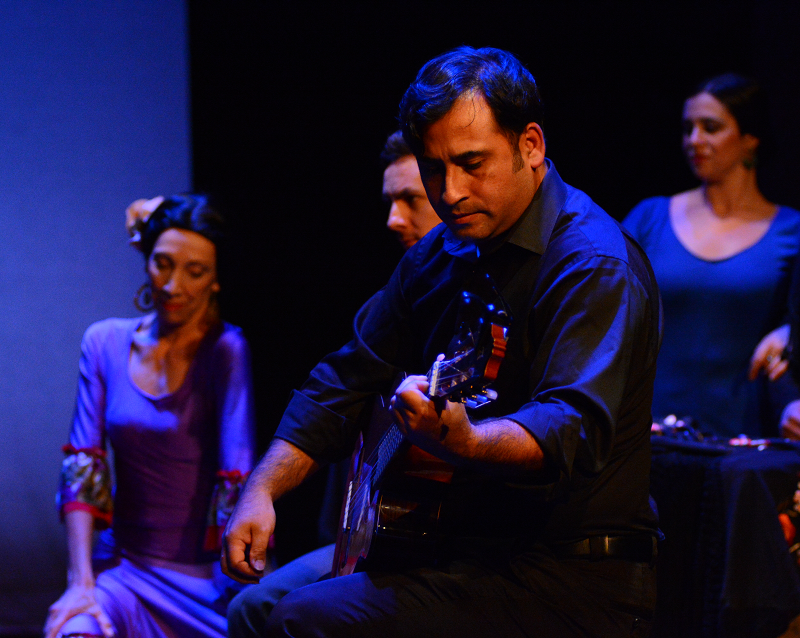‘La Vida Breve’: The In Series’ latest pocket opera success
Guitarist-vocalist Patricio Zamorano provided a lovely and darkly authentic interlude highlighted by his masterful, fluid classical/flamenco guitar technique.
WASHINGTON, October 23, 2014 — Back in the Jurassic Era when I had not yet reached my teens, I generally encountered the music of Manuel de Falla either on black and white TV as background to juggling acts, or at Cleveland Orchestra concerts where orchestral excerpts like the dances from “The Three-Cornered Hat” (“Le tricorne”) filled the overture slot with some frequency. That was pretty much it at the time, at least in the U.S.
Manuel de Falla (1876-1946) even today is much better known in Europe, particularly in Spain where, along with Isaac Albéniz and Enrique Granados, he is regarded as one of Spain’s top musical figures in the 20th century.
Washington’s In Series has recently been introducing the rest of this composer to the public in its successful and inventive “pocket opera” series of performances which offer budget opera performance of works large and small in an intimate setting and at baseball bleacher seat prices. 
In 2012, the Series scored a success with a marvelous performance of Falla’s “El amor brujo” (roughly, “The Bewitched Love”), essentially a ballet that incorporates operatic elements.
This year, this week, the company is wrapping up its current pocket opera production at GALA at Tivoli Square, this time with the composer’s “La vida breve” (“The Short Life”) a short, two-act tragic opera. Composed off and on throughout a ten-year period, the work was premiered in 1914.
To round out the program, the Series has chosen to begin its current program with “¡Viva Zarzuela!” – a clever in-house confection that features “La vida’s” singers and dancers backstage prior to the opera’s performance, all busily warming up with party pieces chosen from various zarzuelas, or Spanish light operas.
The pairing is a great idea, perhaps riffing on Richard Strauss’ “Ariadne auf Naxos,” a comic opera where Act I highlights backstage singing and bickering before Act II’s actual opera. Or perhaps like this summer’s Santa Fe Opera pairing of its “backstage” version of Mozart’s “Impressario” as a lead-in to a performance of Stravinsky’s “Le Rossignol” (“The Nightingale.”)
Each zarzuela selection was delightful in its own way, with many punctuated by dancers and dance music. Several of the numbers in their turn prefigured the action that would later take place in the short opera, adding unity to the production as a whole.

The opera itself is a simple, somewhat melodramatic tragic romance that focuses on the theme of the permanent outsider who is doomed to failure when confronting the establishment. In this case, our tragic heroine, Salud (Shaina Martinez)—a teenaged gypsy girl—actually imagines that her lover Paco (Peter Burroughs)—a somewhat older upper-class gent—will make her dream come true by taking her as his wife.
Well, to employ a current phrase, “Not gonna happen.” As in bigger tragic operas like Verdi’s “La Traviata” (which the In Series performed last season to great success), Paco and his elite-class extended family, the last century’s one-percenters, are quite simply never going to pollute their upper crust bloodlines (and bank accounts) by making marital alliances with society’s untouchables.
Salud’s grandmother, Abuela (Patricia Portillo), cautiously and a bit foolishly encourages the girl’s romantic hopes, perhaps dreaming of her own youth when the scent of young love was heavy in the air.
But Tio Sarvaor (José Sacin), Salud’s uncle, is a realist and is furious at them both for their foolish dreaming. Likewise, his wrath is trained on Paco and his clan, knowing full well he will marry someone in his caste.
Uncle Tio, of course, is correct, which leads to the opera’s tragic Act II climax and denouement.
Whether singing major or minor roles, this production’s large cast is deeply, powerfully involved in Falla’s music and story. As a result, this short opera—whose plot has been criticized by some as too simplistic and reductionist—blossoms into life nonetheless. Its deeply felt emotions, underscored by Falla’s darkly passionate music, stir the memories of many who have experienced the pain and sorrow of unrequited love as well.
As Salud, Shaina Martinez embodies the soul of her awkward, naïve, yet touchingly sincere character. She stumbles relentlessly toward her tragic fate like many a young teen in a horror movie, as the audience holds its collective breath, wanting to shout, “Don’t go in there.” But Salud does, buying into Paco’s seductive insincerity. Her innocence and naïvete are her downfall.
As Ms. Martinez’ Salud stumbles toward the truth, her voice flutters and falters as music and character unite in a genuinely heartbreaking portrayal of Falla’s young tragic heroine.
Patricia Portillo’s Abuela is a more complex character. Obviously, Salud’s grandmother is wiser than she seems. But she is so caught up in the redemptive hope of Salud’s dream that she overrides her own common sense to support her granddaughter’s aspirations.
Ms. Portillo gives a marvelously nuanced interpretation of her character, vocally supporting her many moods. Her voice is clear and authoritative when she is confident and tentative and halting when she is not. It’s this highly effective blending of acting and singing skills that gives Abuela a believable edge.
Although his role is a relatively small one, José Sacin hits it out of the park with his bitter, dominating Uncle Tio. Tio knows a family and social train wreck when he sees one, and is driven to put an early and violent end to it. But he is held back by the women in his family and is ultimately too late to effect the outcome as he, too, is “outclassed,” and instinctively realizes that justice is not possible.
Mr. Sacin gives a vocal performance that is biting, incisive and outraged, cutting like a knife through the soft dreamscape he knows is built on a fleeting, misty structure of deceptive love and false hope.
As Paco, Salud’s fickle upper-class lover, Peter Burroughs plays a somewhat conflicted cad who really does believe he’s in love with Salud. At the moment. He always knows in the back of his mind that his marital alliance must only be with a woman of his own caste. But he can afford to be reckless with Salud because he instinctively knows there will be few if any consequences that the family money can’t finesse.
Again, as with Ms. Portillo, Mr. Burroughs’ vocal interpretation of his role is a subtle one, ranging from passionate authority as the opera begins, to a faltering lack of self-confidence as the horror of what he has done is revealed at the climax.
Supporting roles are handled well by the remainder of the cast, and the choral ensembles, involving most if not all the characters are uncommonly good for a small company, indicating a great deal of time was given to rehearsing this music.
A big plus for this production was the work of the dancers: Alisa Bernstein, Sara Herrera, Laura Quiroga and Tsaitami Duchicela. We saw a bit of what they could do in the program’s zarzuela curtain raiser. But in the opera, they danced crisply and passionately, throwing themselves into their real and symbolic roles in a way that accentuated the tragic action while also giving a visual sense to Falla’s well-known dance music.
Brief, spoken narrations, largely in verse, were appropriately delivered by “A poet” in this production. Brian Shaw handled this role with elegance, helping move this dreamlike production back and forth, in and out of reality with a narrative line strengthened by this production’s use of the poetry of Federico García Lorca, long one of the composer’s closest friends.
Guitarist-vocalist Patricio Zamorano provided a lovely and darkly authentic interlude highlighted by his masterful, fluid classical/flamenco guitar technique.
Director and Choreographer Jaime Coronado’s stage direction kept the singers front and center and kept the action moving along without dragging, and his dance numbers were well calibrated to the theater’s relatively constricted stage area.
Perhaps the biggest ovation, however, should be accorded to this program’s music director and pianist Carlos César Rodriguez. Given that pocket opera also means “economy opera,” Mr. Rodriguez’ piano served as Falla’s entire orchestra in this production.
Working with a piano reduction of an orchestral score is hard enough, requiring skill, conviction, passion, and above all an ability to deal with a tsunami of notes on nearly every page. Mr. Rodriguez conquered every page, dropping very few notes in the process while providing a substantial and convincing “orchestral” backdrop for his singers—all of whom (did we mention?) were superbly rehearsed. A major hat tip to Mr. Rodriguez for his superb effort.
Rating: *** (3 out of 4 stars)
Tickets and information: Remaining performances of “La vida breve” will take place at GALA Hispanic Theater, 3333 14th St. NW, Washington, DC 20010. Dates: Sunday, October 26 at 2:30 p.m.; and Saturday, November 1 at 8:00 p.m. Tickets are priced from $22-42 + $1.75 fee if purchased through “Instant Seats.” For tickets and further information, visit the In Series website via this link.










